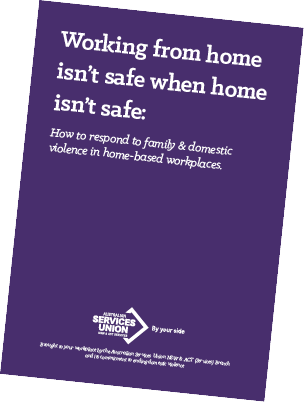As work moves into family homes, family violence moves into the workplace. So the Australian Services Union has developed an invaluable resource for every employee, writes Monica Crouch.
In Australia, one woman is killed every nine days by a partner or former partner, and one in six women over the age of 18 have been victims of intimate partner abuse, says NSW Attorney General Mark Speakman. This, he says, is the “savage reality” of domestic and family violence in Australia.
On the International Day for the Elimination of Violence Against Women (25 November), Speakman was at Trades Hall in Sydney for the launch of Unions NSW’s new and much needed resource: Working from home isn’t safe when home isn’t safe: How to respond to family & domestic violence in home-based workplaces.
It’s an essential guide. It lists signs to look out for, services that offer help, and suggests simple, respectful responses if you suspect a colleague is experiencing domestic violence. It is practical and concise. And in 2020, it is crucial.
Leave provisions a top priority
Also speaking at the launch was Unions NSW Secretary Mark Morey, who noted the day marked five years since unions in NSW had initiated the campaign for a universal entitlement to 10 days’ paid domestic violence leave a year for Australian workers.
“We have achieved 10 days paid domestic and family violence leave for public sector workers in NSW and our unions in the private sector have included many clauses in their agreements,” Morey said. “The NSW union movement has been successful in moving a mountain which many thought could not be moved.”
Domestic violence leave enables women the time and privacy to report to police, to see medical professionals and social workers, to arrange emergency housing, and to attend court to get legal structures in place to protect them and their children. Domestic violence leave can mean the difference between life and death.
“It’s a tiny investment to keep workers, primarily women, safe,” said Speakman, who is also NSW Minister for the Prevention of Domestic Violence.
Australian Services Union NSW & ACT Branch Secretary Natalie Lang, a driving force behind the new resource, is emphatic about this leave. “Why should your experience of family violence and your need to take time from work not be the same as if you had appendicitis?” she asks. “Why should you have any lesser right?”
The IEU has prioritised this leave, so far achieving 10 days’ paid domestic violence leave in the new Catholic Systemic Schools Enterprise Agreement. The union will continue to claim domestic violence leave as a specific category of leave, separate from personal leave or carer’s leave provisions, in other EAs.
The Unions NSW launch also coincides with the international campaign of 16 Days of Activism Against Gender-Based Violence which, Speakman notes, culminates in Human Rights Day on 10 December. “It’s the right to be free from violence,” he said. “It is hard to think of a more fundamental human right.”




































































































































